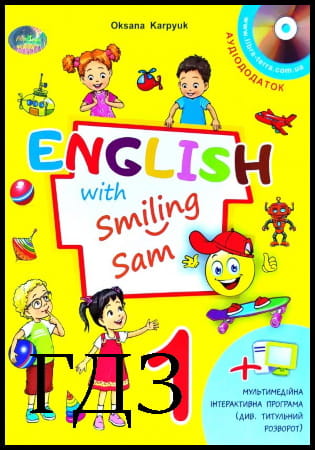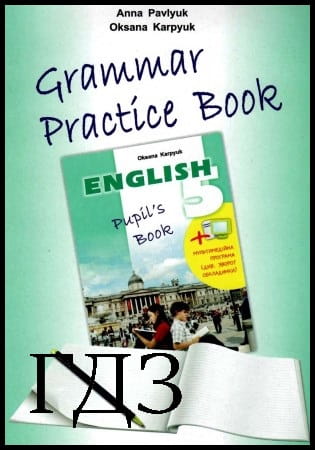ГДЗ Англійська мова 7 клас. Підручник [Карп’юк О.Д.] 2020
UNIT 2. AT HOME
Lesson 1. Doing Chores
р.48 ex.1.
1 — e;
2 — b;
3 — g;
4 — f;
5 — d;
6 —а;
7 — е;
8 — h.
p.49 ex.2.
1. A book. (Because we read a book).
2. A daughter. (Because someone can have a daughter).
3. Sky. (Because we cannot get the sky).
4. The mess. (Because we can make the mess).
5. A eye. (Because we can open an eye).
p.49 ex.3.
Elliot’s mum gets upset when she sees mess in Elliot’s room.
p.49 ex.4.
1) F;
2) F;
3) F;
4) T.
p.50 ex.5.
1) relax;
2) his room;
3) untidy;
4) gets upset;
5) cleans the mess.
p.50 ex.6.
1. I share my room with my brother /sister/. I am alone in my room.
2. Yes, my mother gets upset when she sees my room.
3. Yes, I tidy up my room only when my mum tells me to.
4. I usually put my things on the right place, dust the furniture, clean the floor.
5. Yes, I often do the ironing and the laundry. I like doing that.
6. Yes, I can fix things. Last time I fixed the chair.
7. My mum usually does cooking in my family. As for me, I only can make an omelet, sandwiches, tea and coffee.
p.50 ex.7.
1. What kind of room have you got? a) Cosy, b) Tidy, c) Small, d) Big.
2. What condition is your room usually in? a) Always a mess, b) Sometimes tidy, c) Tidy, d) Untidy.
3. What furniture is there in your room?
In it there is: a) a desk, a bookshelf and a bed; b) a wardrobe, a desk, a bed and a desk; c) a desk, a bed, a chest of drawers and a bookshelf; n d) a desk and a bed.
4. What things are there in your room?
In my room there are many things; a) books, CDs, shoes, pillows; b) clothes, books, notebooks, toys; c) a computer, CDs, books, copybooks; d) windows, chairs, lamps.
5. Where is your desk? In my room the desk is: a) opposite the bed; b) in front of the bed; c) near the bed; d) behind the bed.
6. Where are the posters in your room? In my room the posters are: a) above the bed; b) on my desk; c) on the door; d) I haven’t got posters in my room.
p.52 ex.1.
A woman’s work is never done because the housework never ends. Women usually prepare meals, clean the house, wash the dishes and help children with the homework.
p.54 ex.2.
1. True.
2. False. (Doing shopping is a house holding duty).
3. True.
4. False. (They usually boil sausages in a small pot).
5. False. (They usually fry in the frying pan).
6. True.
7. True.
8. False. (His sister sometimes drinks coffee).
9. False. (His sister washes up with a dishwasher).
10. True.
11. False. (His mother stays at home and does a lot of things about the 'house).
p.54 ex.3.
1. Doing a work about the house is called «doing chores».
2. Usually each member of a family has a house holding duty.
3. Writing notes to each other helps family remember things to do.
4. Usually mother is the busiest person in the house holding chores.
5. We can boil sausages or fry eggs for breakfast.
6. When dish is ready we can serve it with salad.
7. To make tea we should use a kettle and a tea pot.
8. We can wash up and dry the dishes with a dishwasher.
9. We should put clean dishes onto the cupboard.
10. A woman’s work is never done.
p.55 ex.4.
1. I help my mother to cook and I clean my room.
2. My father does the shopping and empties the bin. My mother does the ironing and the washing-up. She cooks the dinner and cleans the house.
3. Yes, she is. She cleans the house and dusts the furniture, she does «the washing and the ironing. She cooks us breakfast and dinner.
4. I am the greatest helping hand for my mother. I learnt a lot from her.
5. We have some machines to help in house holding. They are: a washing machine, a dishwasher, a vacuum cleaner, an iron, a toaster.
6. Sometimes we can write notes to each other to remember things to do.
7. I get up, wash my face and hands, brush my teeth and then I go to the kitchen. My mother is already there. I have breakfast and go to school. Sometimes my mother is busy, so I make a cup of tea and an omelette for myself.
8. Yes, I can. I boil the water in the kettle, put some tea and sugar into my mug and pour hot water there. The tea is ready.
p.55 ex.5.
1. Yes, many of people in Great Britain work at home at the weekends. 2. The British people love their houses and they are very proud of their homes. 3. «Do It Yourself» is called DIY.
p.56 ex.6.
1. Yes, I have. I often stay at home without my mother.
2. I usually played computer games or watched TV.
3. No, I didn’t cook.
4. Yes, I sometimes tidied my room.
5. Yes, my grandma tried to teach me cooking. No, I have never had such a situation.
p.57 ex.1.
b) Don’t expect other people to do your job.
р.58 ex.2.
1 — anything (заперечне речення);
2 — somewhere (стверджувальне речення);
3 — anything (питальне речення);
4 — anything (заперечне речення);
5 — somebody (стверджувальне речення);
6 — something (стверджувальне речення);
7 — anybody (питальне речення), nobody (заперечне речення);
8 — anything (заперечне речення);
9 — nobody (заперечне речення);
10 — anybody (питальне речення);
11 — nothing (заперечне речення);
12 — anywhere (заперечне речення).
p.58 ex.3.
1 — people;
2 — things;
3 — places.
р.58 ex.4.
1 — everybody (стверджувальне речення);
2 — everywhere (стверджувальне речення);
3 — something (стверджувальне речення);
4 — anywhere (питальне речення);
5 — everybody (стверджувальне речення);
6 — nothing (заперечне речення);
7 — somebody (стверджувальне речення);
8 — nowhere (заперечне речення).
p.59 ex.1.
1. A: Who does the shopping in your family? B: Sometimes I do, but usually my mum does. A: And who usually cooks dinner? B: My mum does.
2. A: Who usually does the washing up at your home? B: Sometimes I do, sometimes my mother does. A: Who usually tidies your room? B: I usually tidy my room.
3. A: Who usually does the ironing in your family? B: My mother usually does. A: Who usually airs the room? B: My mother usually does.
p.59 ex.2.
1. I think Tim Robinson doesn’t like both walking the dog and making his bed.
2. I think Mr. Robinson likes shopping and fixing things but he doesn’t like cooking.
3. I think Liz Robinson doesn’t like washing up but she likes shopping.
p.60 ex.3.
b) A: Have you made your bed and tidied your room already? B: Yes, I have.
A: Have you done your homework? B: Not yet.
A: Have you cooked some spaghetti? B: Yes, I have. I have just eaten them.
A: Have you washed the dirty clothes already? B: No, I haven’t.
A: Have you taken the video back to the video club? B: Yes, I have done it.
A: Have you phoned for a pizza? B: Yes, I have just phoned!
p.60 ex.4.
I cannot agree with the first girl. I think we must help our parents about the house because we live in our house, too. And I am also sure it is useful to learn to do everything with your own hands for the future.
p.61 ex.5.
1. We use a washing machine for washing our clothes and linen.
2. We use a vacuum cleaner for cleaning the floor and carpets.
3. We use a hairdryer for drying our hair.
4. We use a microwave oven for fast cooking or warming up food.
5. We use an electric saw for cutting wood.
6. We use a toaster for making toasts.
7. We use a dishwasher for washing up plates and glasses.
p.62 ex.6.
1 — c;
2 — f;
3 — е;
4 — g;
5 — а;
6 — h;
7 — d;
8 — b.
p.62 ex.7.
I would like to have a robot who helps with house holding. It would be a small square machine with four arms. Each arm would have different function. It would have sensor eyes. I’m not sure about the belly. Maybe there will be a battery for charging or some drawers for tools. The robot would receive calls via mobile phone. So I’d call, from school and would ask him to heat the dinner or to air the room. It would do most of the housework.
My typical day with the robot would be like that: I get up in the morning and the robot makes my bed. It prepares my breakfast. When I’m at school, it washes up, tidies the rooms, cooks dinner. When I come back home, it cleans my school uniform, my shoes, does the shopping through the Internet. It reminds me to do my homework or helps me to do it. It also washes clothes or irons it, when it is necessary.
p.63 ex.1.
1. Jane has been cleaning the carpet, doing the washing up and helping her dad to do the shopping that day.
2. Tommy has been feeding the parrot, watering the flowers and making a bed.
3. Father Sam has been doing shopping.
4. All the family has been visiting Mrs. Brown.
p.63 ex.2.
My Usual Work about the House
My family is not big. Each of us has some house holding chores. My duty is to walk our dog three times a day. I also do the shopping with my mum, carry out the rubbish bin, water flowers, tidy my room and take my little brother from the kindergarten. At the weekends, I like to help my mum cooking.
p.63 ex.8.
1. Yes, my family often works about the house at the weekends.
2. My parents and I love our home very much.
3. My family does repairs and improvements to our flat almost every summer.
4. No, these days don’t have special names.
5. On these days, I usually help my father to do repairs, help my mum cooking, tidy tip the flat, go shopping.
 ГДЗ Англійська мова 7 клас Підручник Карп'юк 2020 Астон
ГДЗ Англійська мова 7 клас Підручник Карп'юк 2020 Астон
 Якщо помітили в тексті помилку, виділіть її та натисніть Ctrl + Enter
Якщо помітили в тексті помилку, виділіть її та натисніть Ctrl + Enter
Lesson 1. Doing Chores
р.48 ex.1.
1 — e;
2 — b;
3 — g;
4 — f;
5 — d;
6 —а;
7 — е;
8 — h.
p.49 ex.2.
1. A book. (Because we read a book).
2. A daughter. (Because someone can have a daughter).
3. Sky. (Because we cannot get the sky).
4. The mess. (Because we can make the mess).
5. A eye. (Because we can open an eye).
p.49 ex.3.
Elliot’s mum gets upset when she sees mess in Elliot’s room.
p.49 ex.4.
1) F;
2) F;
3) F;
4) T.
p.50 ex.5.
1) relax;
2) his room;
3) untidy;
4) gets upset;
5) cleans the mess.
p.50 ex.6.
1. I share my room with my brother /sister/. I am alone in my room.
2. Yes, my mother gets upset when she sees my room.
3. Yes, I tidy up my room only when my mum tells me to.
4. I usually put my things on the right place, dust the furniture, clean the floor.
5. Yes, I often do the ironing and the laundry. I like doing that.
6. Yes, I can fix things. Last time I fixed the chair.
7. My mum usually does cooking in my family. As for me, I only can make an omelet, sandwiches, tea and coffee.
p.50 ex.7.
1. What kind of room have you got? a) Cosy, b) Tidy, c) Small, d) Big.
2. What condition is your room usually in? a) Always a mess, b) Sometimes tidy, c) Tidy, d) Untidy.
3. What furniture is there in your room?
In it there is: a) a desk, a bookshelf and a bed; b) a wardrobe, a desk, a bed and a desk; c) a desk, a bed, a chest of drawers and a bookshelf; n d) a desk and a bed.
4. What things are there in your room?
In my room there are many things; a) books, CDs, shoes, pillows; b) clothes, books, notebooks, toys; c) a computer, CDs, books, copybooks; d) windows, chairs, lamps.
5. Where is your desk? In my room the desk is: a) opposite the bed; b) in front of the bed; c) near the bed; d) behind the bed.
6. Where are the posters in your room? In my room the posters are: a) above the bed; b) on my desk; c) on the door; d) I haven’t got posters in my room.
p.52 ex.1.
A woman’s work is never done because the housework never ends. Women usually prepare meals, clean the house, wash the dishes and help children with the homework.
p.54 ex.2.
1. True.
2. False. (Doing shopping is a house holding duty).
3. True.
4. False. (They usually boil sausages in a small pot).
5. False. (They usually fry in the frying pan).
6. True.
7. True.
8. False. (His sister sometimes drinks coffee).
9. False. (His sister washes up with a dishwasher).
10. True.
11. False. (His mother stays at home and does a lot of things about the 'house).
p.54 ex.3.
1. Doing a work about the house is called «doing chores».
2. Usually each member of a family has a house holding duty.
3. Writing notes to each other helps family remember things to do.
4. Usually mother is the busiest person in the house holding chores.
5. We can boil sausages or fry eggs for breakfast.
6. When dish is ready we can serve it with salad.
7. To make tea we should use a kettle and a tea pot.
8. We can wash up and dry the dishes with a dishwasher.
9. We should put clean dishes onto the cupboard.
10. A woman’s work is never done.
p.55 ex.4.
1. I help my mother to cook and I clean my room.
2. My father does the shopping and empties the bin. My mother does the ironing and the washing-up. She cooks the dinner and cleans the house.
3. Yes, she is. She cleans the house and dusts the furniture, she does «the washing and the ironing. She cooks us breakfast and dinner.
4. I am the greatest helping hand for my mother. I learnt a lot from her.
5. We have some machines to help in house holding. They are: a washing machine, a dishwasher, a vacuum cleaner, an iron, a toaster.
6. Sometimes we can write notes to each other to remember things to do.
7. I get up, wash my face and hands, brush my teeth and then I go to the kitchen. My mother is already there. I have breakfast and go to school. Sometimes my mother is busy, so I make a cup of tea and an omelette for myself.
8. Yes, I can. I boil the water in the kettle, put some tea and sugar into my mug and pour hot water there. The tea is ready.
p.55 ex.5.
1. Yes, many of people in Great Britain work at home at the weekends. 2. The British people love their houses and they are very proud of their homes. 3. «Do It Yourself» is called DIY.
p.56 ex.6.
1. Yes, I have. I often stay at home without my mother.
2. I usually played computer games or watched TV.
3. No, I didn’t cook.
4. Yes, I sometimes tidied my room.
5. Yes, my grandma tried to teach me cooking. No, I have never had such a situation.
p.57 ex.1.
b) Don’t expect other people to do your job.
р.58 ex.2.
1 — anything (заперечне речення);
2 — somewhere (стверджувальне речення);
3 — anything (питальне речення);
4 — anything (заперечне речення);
5 — somebody (стверджувальне речення);
6 — something (стверджувальне речення);
7 — anybody (питальне речення), nobody (заперечне речення);
8 — anything (заперечне речення);
9 — nobody (заперечне речення);
10 — anybody (питальне речення);
11 — nothing (заперечне речення);
12 — anywhere (заперечне речення).
p.58 ex.3.
1 — people;
2 — things;
3 — places.
р.58 ex.4.
1 — everybody (стверджувальне речення);
2 — everywhere (стверджувальне речення);
3 — something (стверджувальне речення);
4 — anywhere (питальне речення);
5 — everybody (стверджувальне речення);
6 — nothing (заперечне речення);
7 — somebody (стверджувальне речення);
8 — nowhere (заперечне речення).
p.59 ex.1.
1. A: Who does the shopping in your family? B: Sometimes I do, but usually my mum does. A: And who usually cooks dinner? B: My mum does.
2. A: Who usually does the washing up at your home? B: Sometimes I do, sometimes my mother does. A: Who usually tidies your room? B: I usually tidy my room.
3. A: Who usually does the ironing in your family? B: My mother usually does. A: Who usually airs the room? B: My mother usually does.
p.59 ex.2.
1. I think Tim Robinson doesn’t like both walking the dog and making his bed.
2. I think Mr. Robinson likes shopping and fixing things but he doesn’t like cooking.
3. I think Liz Robinson doesn’t like washing up but she likes shopping.
p.60 ex.3.
b) A: Have you made your bed and tidied your room already? B: Yes, I have.
A: Have you done your homework? B: Not yet.
A: Have you cooked some spaghetti? B: Yes, I have. I have just eaten them.
A: Have you washed the dirty clothes already? B: No, I haven’t.
A: Have you taken the video back to the video club? B: Yes, I have done it.
A: Have you phoned for a pizza? B: Yes, I have just phoned!
p.60 ex.4.
I cannot agree with the first girl. I think we must help our parents about the house because we live in our house, too. And I am also sure it is useful to learn to do everything with your own hands for the future.
p.61 ex.5.
1. We use a washing machine for washing our clothes and linen.
2. We use a vacuum cleaner for cleaning the floor and carpets.
3. We use a hairdryer for drying our hair.
4. We use a microwave oven for fast cooking or warming up food.
5. We use an electric saw for cutting wood.
6. We use a toaster for making toasts.
7. We use a dishwasher for washing up plates and glasses.
p.62 ex.6.
1 — c;
2 — f;
3 — е;
4 — g;
5 — а;
6 — h;
7 — d;
8 — b.
p.62 ex.7.
I would like to have a robot who helps with house holding. It would be a small square machine with four arms. Each arm would have different function. It would have sensor eyes. I’m not sure about the belly. Maybe there will be a battery for charging or some drawers for tools. The robot would receive calls via mobile phone. So I’d call, from school and would ask him to heat the dinner or to air the room. It would do most of the housework.
My typical day with the robot would be like that: I get up in the morning and the robot makes my bed. It prepares my breakfast. When I’m at school, it washes up, tidies the rooms, cooks dinner. When I come back home, it cleans my school uniform, my shoes, does the shopping through the Internet. It reminds me to do my homework or helps me to do it. It also washes clothes or irons it, when it is necessary.
p.63 ex.1.
1. Jane has been cleaning the carpet, doing the washing up and helping her dad to do the shopping that day.
2. Tommy has been feeding the parrot, watering the flowers and making a bed.
3. Father Sam has been doing shopping.
4. All the family has been visiting Mrs. Brown.
p.63 ex.2.
My Usual Work about the House
My family is not big. Each of us has some house holding chores. My duty is to walk our dog three times a day. I also do the shopping with my mum, carry out the rubbish bin, water flowers, tidy my room and take my little brother from the kindergarten. At the weekends, I like to help my mum cooking.
p.63 ex.8.
1. Yes, my family often works about the house at the weekends.
2. My parents and I love our home very much.
3. My family does repairs and improvements to our flat almost every summer.
4. No, these days don’t have special names.
5. On these days, I usually help my father to do repairs, help my mum cooking, tidy tip the flat, go shopping.
 ГДЗ Англійська мова 7 клас Підручник Карп'юк 2020 Астон
ГДЗ Англійська мова 7 клас Підручник Карп'юк 2020 Астон
 Якщо помітили в тексті помилку, виділіть її та натисніть Ctrl + Enter
Якщо помітили в тексті помилку, виділіть її та натисніть Ctrl + Enter 25.01.2021,
25.01.2021,
 6 329,
6 329,
 0
0
 Назад
Назад




![ГДЗ Природознавство 5 клас. Підручник [Ярошенко О.Г., Бойко В.М.] 2018 ГДЗ Природознавство 5 клас. Підручник [Ярошенко О.Г., Бойко В.М.] 2018](/uploads/posts/2019-04/1555779316_5_p_y_u2018.jpg)
![ГДЗ Основи правознавства 9 клас. Підручник [Наровлянський О. Д.] 2017 ГДЗ Основи правознавства 9 клас. Підручник [Наровлянський О. Д.] 2017](/uploads/posts/2019-02/1550928122_9k_p_n_2017.jpg)
![ГДЗ Українська мова 8 клас. Підручник [Глазова О.П.] 2021 ГДЗ Українська мова 8 клас. Підручник [Глазова О.П.] 2021](/uploads/posts/2021-10/1633720388_8k_y_g_2021.jpg)
![ГДЗ Вступ до історії 5 клас. Підручник [Гісем О.В.] 2018 ГДЗ Вступ до історії 5 клас. Підручник [Гісем О.В.] 2018](/uploads/posts/2019-07/1564163269_5k_i_h_2018.jpg)